The smell hits you as soon as you’re though the door: a nose-wrinkling perfume of metal, sweat and men. Muscleworks in Bethnal Green, a gym especially popular with bodybuilders, is home to so much equipment that there is virtually no space for me to slalom my way between the weights, bars and machines. Constant, frenetic activity clatters around me, the irregular clank of iron filling the air. It’s like a war zone but with slightly more Eminem. A man in a grey T-shirt and Beats headphones heaves weights up to his chin, an involuntary grimace forming at the climax of each rep, a vein on his temple throbbing.
The men in this gym are trying to transform their bodies – not in the few-chin-ups-after-work way that you and your colleagues feel somewhat obliged to, but in such a way that their legs resemble mountain ranges and their skin looks as though it has been packed full of beach balls; in such a way that they begin to look incomprehensibly, almost inexplicably, huge. The received wisdom is that bulking up will, among other things, improve your chances of finding a partner. But, when the pursuit of muscle is consuming your every waking moment, radically altering your body and eating up all your energy, does it jeopardise your love life?
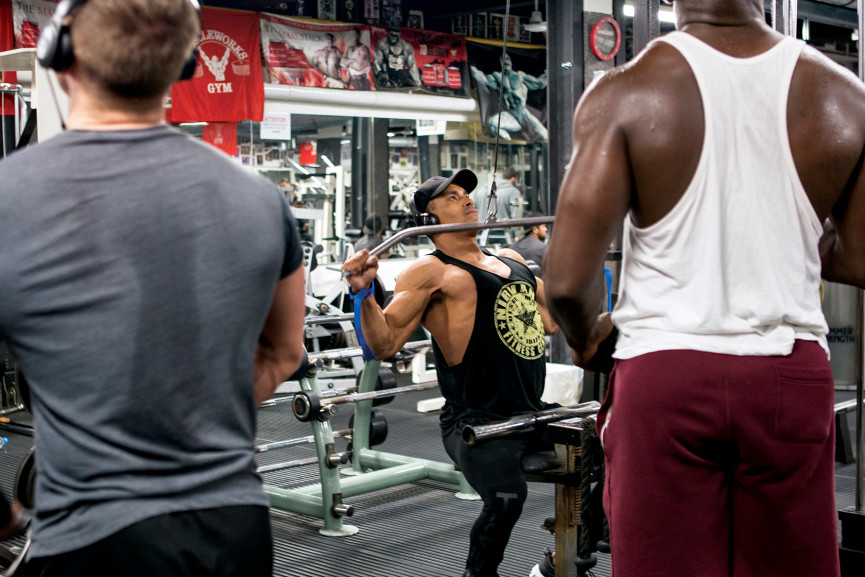
Inside East London’s Muscleworks gym
At the end of his workout I speak to Joseph Mitchell-Hartley (above), a huge fireman who came second in a UK Bodybuilding Federation event last year. He had always thought that beefing up would improve his chances with women – and it has – but his involvement in that tournament was the direct cause of his long-term relationship breaking down. Preparing for a show meant devoting every minute to the management of muscle. “It was just the fact that we weren’t seeing each other enough per week,” he says. “And we didn’t live that far away from each other.” Now, in a different relationship, long-distance this time, things are all right. But for how long?
“Both my relationships ended because of bodybuilding,” says Mark Palfery, a 50-year-old bodybuilder. “It’s an unusual world.” Palfery married a woman at the age of 23, when he was in the process of transitioning from competitive kickboxing to bodybuilding. In a short space of time he bulked up from 11 stone to 17 stone and, in his wife’s words, turned into a “monster”. She said that going to bed with him became like having sex with a pitbull terrier. “Where’s the normal, quiet, unassuming guy that I met gone?” Palfery remembers her saying. “He’s been replaced with this hulk who breathes heavily, weighs twice as much, can’t fit in any clothes…” At the gym, while working out around another woman, Palfery began an affair that caused his wife to divorce him. His second marriage, though with a title-winning female bodybuilder, dissolved partly because she had a meltdown about her appearance. Maintaining a relationship when you are a bodybuilder is, in Palfery’s words, “very very difficult”.
Researching this piece, I notice a pattern. Palfery and Mitchell-Hartley are far from the only competitors to have seen loved ones leave them because of the sport. In its demands on the body, bodybuilding is like almost no other athletic pursuit. Professional musclemen eat up to seven meals every 24 hours, have to spend more or less every day in the gym, virtually never drink alcohol and are often on steroids that come with a number of miserable side effects including impotence. These men are so focused on their own body, in other words, that they struggle to care for anyone else’s.
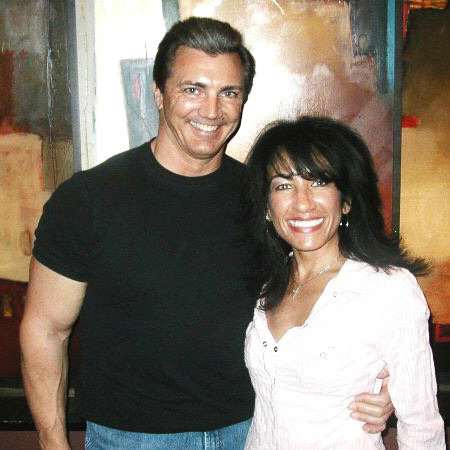
John Hansen, 1992’s Mr Natural Universe
Winner of the Natural Mr Universe in 1992, John Hansen (above) had a remarkable body in his prime – the envy of men and, one would imagine, irresistible to plenty of women. Speaking to me on the phone, he is extremely sweet. He describes himself as the black sheep of his family: he is 55 years old but has never been married, and doesn’t have any children. “I found a lot of women that liked muscular bodies,” he says, “but they didn’t like what goes into developing those bodies.” He was so obsessed with bodybuilding that he “didn’t have the normal teenage existence” and avoided relationships because he didn’t want to get distracted.
He remembers the chairman of Amateur Athletic Union’s Illinois branch telling him the story of a boy who could have won Mr Teenage America but started dating a girl while training. The relationship ended, the boy’s heart broke, and he didn’t enter the tournament. “That story scared me,” says Hansen, “and I stayed away from women for all my teenage years.”
Later, he did pursue a number of relationships, some of which lasted years, but girlfriends tended to break up with him when he was training for competitions – a constant in a bodybuilder’s calendar, and the period during which they are strictest about their regime. “They didn’t understand the dedication to it,” he says. “It’s really a 24-hour-a-day routine. If your diet is off, even by a little bit, you’re not gonna be ripped – and if you’re not ripped, you’ll probably lose.”
In one relationship, he and his girlfriend went for a couple of months without sex, and Hansen didn’t even notice because he was preparing for an event. “She actually thought I was gay because I wasn’t having sex with her,” he says. “She ended up cheating on me with some other guys because I wasn’t giving her enough attention.”
“The bodybuilding lifestyle has to be somewhat selfish, especially if you’re shooting towards a goal,” Jay Cutler, a four-time Mr Olympia winner, tells me. “That can be very stressful on relationships. I was married for quite a time to my career.” Marc Lobliner (below), who describes himself as an entrepreneur and bodybuilder, says, “It absolutely destroys the romantic part of relationships, for most people.”
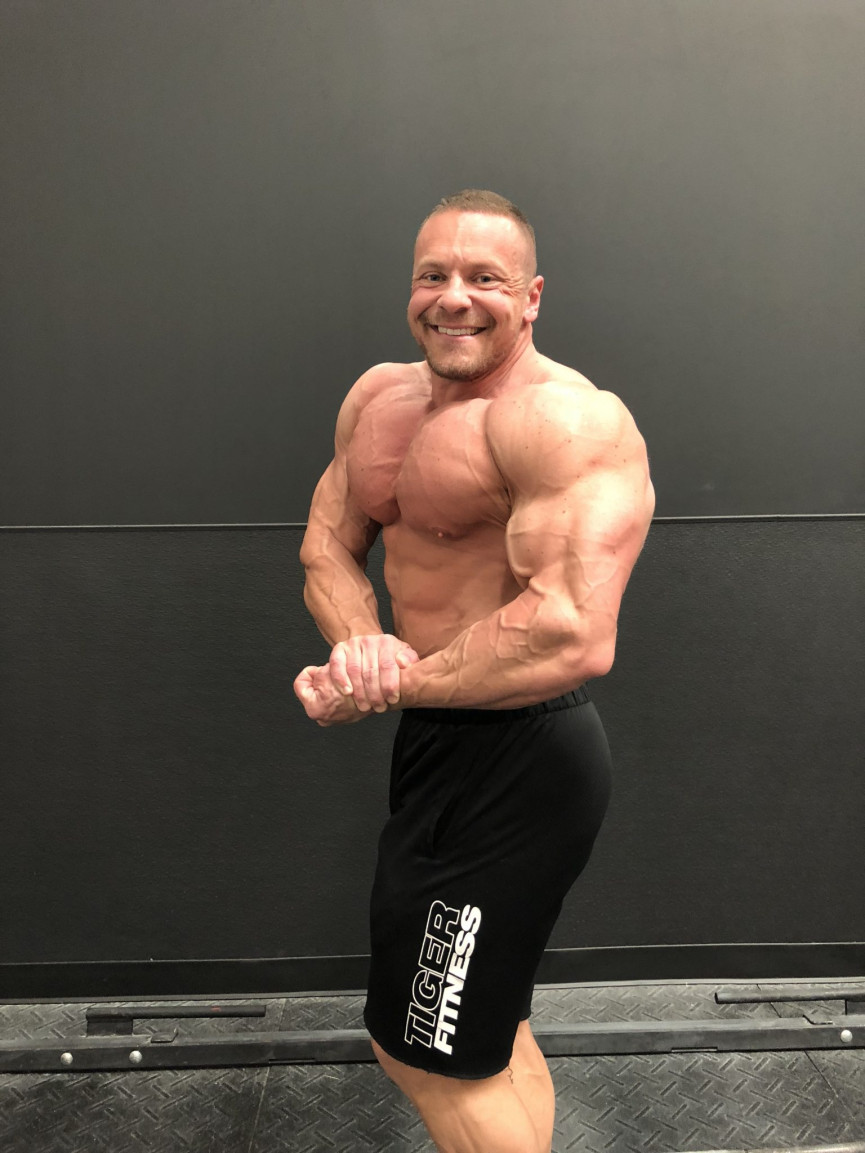
Businessman and bodybuilder Marc Lobliner
“We all have this misconception that women give a shit. And women really don’t care”
Lobliner has been married since high school. He was a businessman before he got into bodybuilding and says he always advises people against taking it up as a career, when it will threaten to destroy relationships. “Bodybuilding, when used as a tool to enhance, not take over, your life, is the most amazing thing ever created,” he says. “But when taken to the extreme, like anything, it’s not good.” The problem is that, by definition, bodybuilding is all about extremes.
Bodybuilders are aiming to attain a body they consider visually pleasing. Not everyone, however, necessarily finds this ‘ideal body’ attractive. I know this partly because I have seen people’s reactions to the photos of the bodybuilders featured in this piece. “I remember showing a person my legs and she just looked like she was about to be sick,” says Palfery. Flex Lewis, the current Mr Olympia in the ‘212’ category – in which men have to be less than 5ft 5in and weigh under 212lb – says that a lot of people would consider his body “disgusting”; Ric Drasin, a 74-year-old ex-bodybuilder who trained with Arnold Schwarzenegger, says that, unless they are bodybuilders themselves, women aren’t attracted to the Olympia-size bodybuilders because they’re so huge they can barely walk.
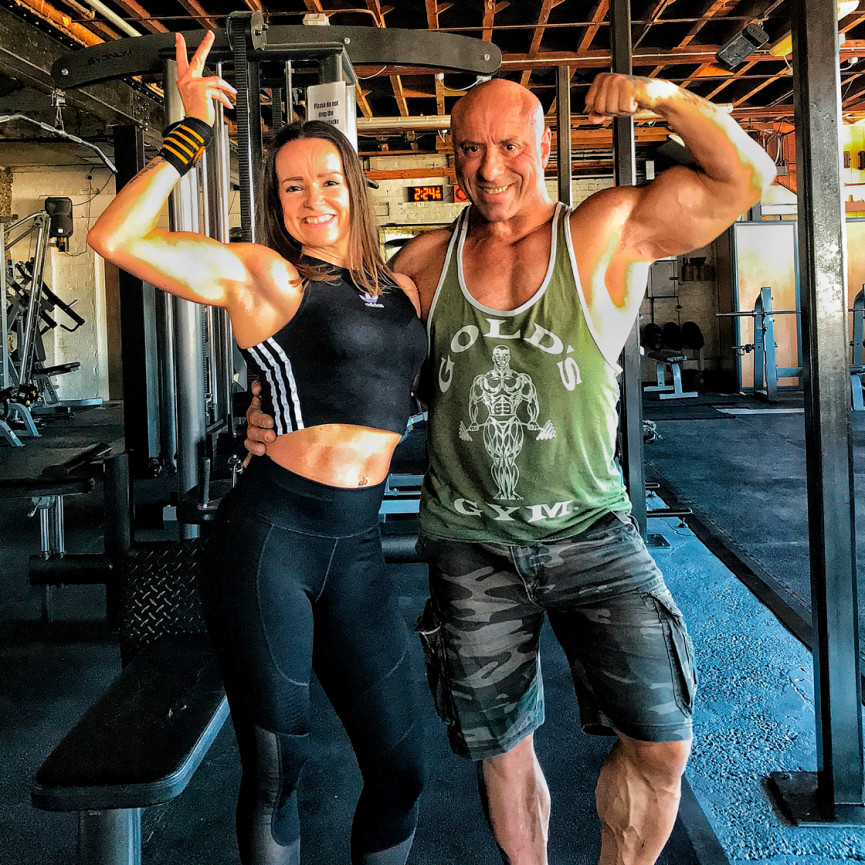
Mark Palfery now coaches other bodybuilders
According to Lobliner, “I think we all have this misconception that women give a shit. And women really don’t care. While women inherently want to feel protected and feel safe with their spouse, they also want someone who can support them and provide for them. Bill Gates never had a problem getting dates.”
Bill Gates has also probably never taken steroids – another factor in a bodybuilder’s routine that can damage their love life. Lobliner says he has seen steroids completely destroy men’s lives. “If you give steroids to a guy who’s a jerk, it makes him an even bigger jerk,” he explains. The drugs are known to cause mood swings, and Palfery points out that they also cause men to lose their hair.
Hansen hasn’t been in a serious relationship since his late-thirties. “You really have to share your dream with your partner in order for it to work out. You can’t just be alone in this journey,” he says. Drasin, twice divorced, saw his first marriage break down because of bodybuilding and other problems: his wife didn’t like that he was gone for most of the day, and he also thinks that she didn’t like the fact that he was around women a lot of the time (“Women liked me”). In an eerie parallel with Palfery’s life, he met a girl 20 years younger than him at the gym and they started a relationship. But that, too, fell by the wayside.

Flex Lewis is the current Mr Olympia in the ‘212’ category
I wonder if it is possible to be a competitive bodybuilder while maintaining a stable romantic relationship. Flex Lewis and Ryan Terry, married and engaged respectively, seem to prove that you can have your cake and eat it. What’s their secret?
Terry, ambassador for leading sports nutrition brand USN and third-placed in the Men’s Physique category of this year’s Mr Olympia, starts by reinforcing the idea that the sport is selfish. “It is a lifestyle; you have to live and breathe it 24/7,” he says. “I didn’t have time for relationships.” But four years ago, he met his fiancée Amy, a solicitor. “I do think my best years have been since meeting Amy. I was honest from the start and I was conscious of not being selfish. I always made time for Amy.”
“I couldn’t date a person that doesn’t train. They don’t feel right. They feel soft and of no substance”
Terry’s argument is, in fact, that without a stable partner, bodybuilders can’t reach the top. He says that he knows people who have lost their wives to bodybuilding but also people who have only won major tournaments because of the “support network” that a partner and family provide. “You can’t really do that on your own,” he says. “I would say that it’s not necessary, but it definitely does help,” says Cutler, who was married for the vast majority of his extremely successful career.
Lewis believes that, for his career, a solid relationship has been crucial: “I’ve always been a girlfriend type of guy because balance, for me, is a massive aid in my training.” He has had to adapt according to the needs of his partner: “Instead of maybe going to the gym that day, I’ve decided to take that day off and give that girl her attention because it’s needed. It’s all about balance.”
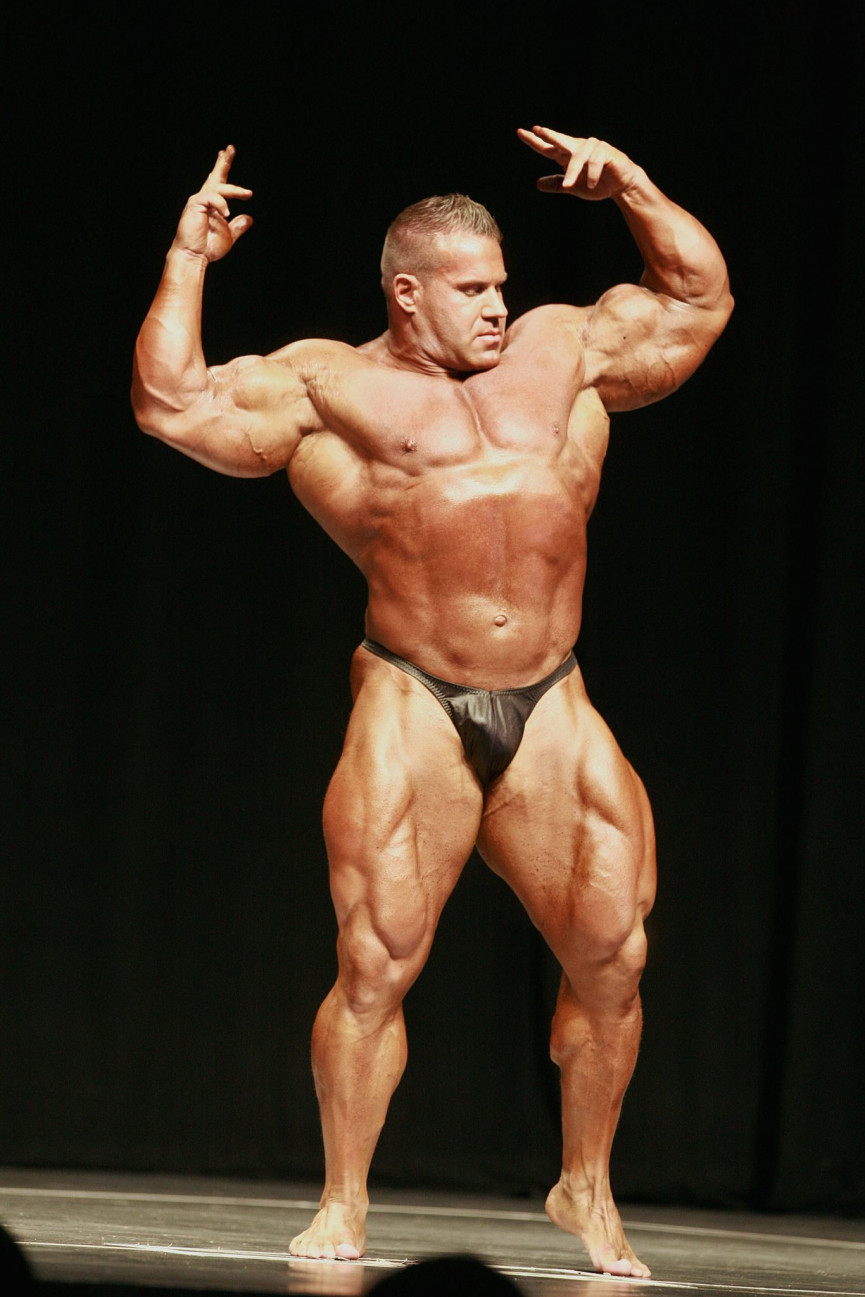
Jay Cutler in 2013
Decades ago, meeting like-minded women was far more difficult for bodybuilders because the pursuit was so male-dominated. It is easier these days, my interviewees tell me, because there is no longer a stigma about women lifting weights. “It would be easier for a single guy to actually meet somebody within the industry,” says Lewis, “because they then have some sort of common love – they follow the lifestyle, they eat similarly.” The rise in women going to the gym has also meant that men – bodybuilders especially – have come to expect a certain level of athleticism in their partner. Or, in Palfery’s words, “I couldn’t date a person that doesn’t train. They don’t feel right when I touch them. They feel soft and of no substance.”
Bodybuilding fascinates us because it takes to an eye-popping extreme an urge shared by the majority of men: that if we can improve our bodies, we can improve our lives. What distinguishes professionals is the levels of loneliness they are willing to experience. None of the men to whom I speak sound as though they regret the thousands of hours they spent in the gym. But, like other people who have seen their marriage ruined by their career, they might regret the result.
Lobliner recommends finding some perspective. “Who’s gonna be there when you’re 90, laying in bed and you can’t move?” he says. “It’s not gonna be the people cheering for you in the audience. It’s gonna be your wife.” To most bodybuilders, this advice might sound like a foreign language: they will never lower their goals for anyone, even their partner. But, while we may once have admired them for that kind of dedication, for me this respect is now coloured with something close to pity. If there’s no one there to hold their hand, was there any point?
(CGI illustration: Justin Metz)
(Photography: Getty Images, Alice Griffiths)
Latest


Ten things you need to know about Hyrox


Is clubbing actually good for you? We asked an expert

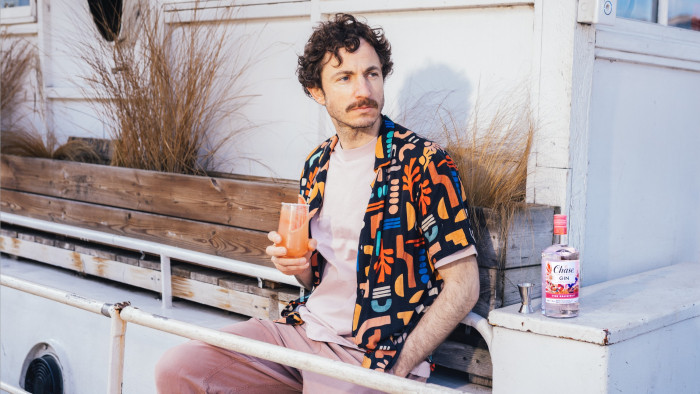
Horticulturist shares tips on how to urban garden
Related Reviews and Shortlists


Best gifts for runners that they'll actually want and use






